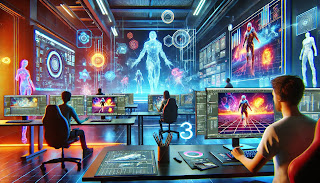As the gaming industry continues to evolve, the role of 3D animation in game
development is becoming increasingly significant. For game studios in London
and beyond, staying ahead of the curve means embracing the latest trends in
3D animation. This guide will explore the future trends in 3D animation that are
set to shape the industry, helping you understand how your game studio can
leverage these advancements to create cutting-edge games.
1. Real-Time Rendering
Real-time rendering is revolutionizing how 3D animation is used in games.
Unlike traditional rendering, which can be time-consuming, real-time rendering
allows for immediate feedback and adjustments. This technology enables game
studios to create more dynamic and interactive environments. For a 3D
animation company, mastering real-time rendering techniques is crucial for
delivering high-quality visuals efficiently.
2. AI and Machine Learning
Artificial Intelligence (AI) and Machine Learning (ML) are transforming 3D
animation by automating complex processes and enhancing animation realism.
AI can assist in creating more natural character movements and improving
facial animations. Game studios in London that incorporate AI-driven tools
can significantly reduce production times while maintaining high standards of quality.
3. Virtual Reality (VR) and Augmented Reality (AR)
The integration of VR and AR is pushing the boundaries of immersive gaming
experiences. 3D animation is at the heart of these technologies, creating
lifelike environments and interactive elements. Game studios focusing on
VR and AR can offer players a more engaging and realistic experience.
Keeping up with VR and AR trends is essential for any 3D animation company
aiming to stay relevant in the market.
4. Procedural Animation
Procedural animation involves using algorithms to automatically generate
animations. This method allows for more dynamic and varied character
movements, especially useful in open-world games where character interactions
need to be diverse and realistic. Game studios can leverage procedural
animation to create more immersive worlds with less manual animation work.
5. Enhanced Motion Capture
Motion capture technology is becoming more advanced, with higher precision
and better integration into animation pipelines. Enhanced motion capture
allows for more accurate and nuanced character animations. For game
studios in London, investing in state-of-the-art motion capture technology
can lead to more lifelike characters and improved player experiences.
6. Cross-Platform Development
As gaming platforms diversify, the ability to create cross-platform games is
increasingly important. 3D animation companies need to adapt their
workflows to ensure animations look and perform well across different
devices and platforms. Game studios that excel in cross-platform development
can reach a broader audience and maximize their game's potential.
7. Sustainability in Animation
With a growing emphasis on sustainability, game studios are looking for
ways to reduce their carbon footprint. This includes optimizing animation
processes to be more energy-efficient and using cloud-based solutions to
minimize hardware usage. A 3D animation company that prioritizes
sustainability can not only reduce costs but also appeal to environmentally
conscious consumers.
8. Collaborative Tools and Remote Work
The shift towards remote work has accelerated the development of collaborative
tools. These tools allow teams to work together seamlessly, regardless of
their physical location. Game studios in London can benefit from these
advancements by tapping into a global talent pool and maintaining
productivity through efficient collaboration.
Conclusion
The future of 3D animation in game development is bright and full of
opportunities. By staying informed about these trends, game studios in
London and worldwide can enhance their production processes, create
more engaging games, and stay competitive in the market. Whether you are
a game studio or a 3D animation company, embracing these trends will be
key to your success in the ever-evolving gaming industry.

.jpg)

.jpg)
No comments:
Post a Comment